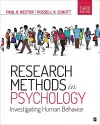
Research Methods in Psychology
2 authors - Paperback
£133.00
Paul G. Nestor, PhD, is professor of psychology at the University of Massachusetts, Boston, and assistant professor in psychology in the department of psychiatry at Harvard Medical School. A summa cum laude and Phi Beta Kappa graduate of Boston University, he earned his MA and PhD in clinical psychology from The Catholic University of America, and was a postdoctoral fellow in the National Institute of Mental Health Clinical Research Training Program at Harvard Medical School. His peer-reviewed publications cover a variety of areas in behavioral science, including neuropsychology, structural and functional neuroimaging, attention, memory, personality, forensic psychology, and schizophrenia. He has authored or co-authored over one-hundred peer-reviewed articles in some of the most prominent journals. His research has been federally supported by competitive grants from both the National Institute of Mental Health and the Department of Veterans Affairs. He is a past recipient of a Veterans Administration Merit Review Award, “Cognitive Neuroscience Studies of Schizophrenia.” He is also the past recipient of the University of Massachusetts, Boston Chancellor’s Award for Distinguished Scholarship for his research in psychology. His teaching has been recognized by the University of Massachusetts, Boston College of Arts and Sciences’ Outstanding Faculty Achievement Award. Nestor also has experience in media presentation for both television and radio, including having his research featured on the Discovery Channel and on WUMB. He is a licensed psychologist in Massachusetts, specializing in clinical psychology, neuropsychology, and forensic psychology. Russell K. Schutt, PhD, is Professor of Sociology at the University of Massachusetts Boston; Clinical Research Scientist I at the Beth Israel Deaconess Medical Center; and Lecturer (part-time) in the Department of Psychiatry, Harvard Medical School. He completed his BA, MA, and PhD degrees at the University of Illinois at Chicago and his postdoctoral fellowship in the Sociology of Social Control Training Program at Yale University. In addition to co-authoring The Practice of Research in Criminology and Criminal Justice and Fundamentals of Research in Criminology and Criminal Justice (with Ronet Bachman), he is the author of Investigating the Social World: The Process and Practice of Research and Understanding the Social World: Research Methods for the 21st Century, and co-author of Making Sense of the Social World (with Dan Chambliss), Research Methods in Psychology (with Paul G. Nestor), The Practice of Research in Social Work and Fundamentals of Social Work Research (with Ray Engel), and Research Methods in Education (with Joseph Check), all with SAGE Publications, as well as author of Homelessness, Housing, and Mental Illness and Organization in a Changing Environment, coeditor of Social Neuroscience: Brain, Mind, and Society and of The Organizational Response to Social Problems, and coauthor of Responding to the Homeless: Policy and Practice. He has authored and coauthored more than 65 peer-reviewed journal articles as well as many book chapters and research reports on homelessness, mental health, service preferences and satisfaction, organizations, and the sociology of law. His current and most recent research includes a $200,000 National Science Foundation-funded study of the social impact of the pandemic in Boston, with collaborators at the Center for Survey Research (UMass Boston) and Northeastern University, a $3.8 million randomized comparative effectiveness trial of two socially-oriented interventions to improve community functioning among persons diagnosed with serious mental illness, funded by the Patient-Centered Outcomes Research Institute (PCORI) at the Beth Israel Deaconess Medical Center with collaborators at the Harvard Medical School, and a $1 million Veterans Health Administration-funded study of peer support with colleagues at the University of Massachusetts Medical School and the VA. His past research has been funded by the National Cancer Institute, the Veterans Health Administration, the National Institute of Mental Health, the Fetzer Institute, and state agencies. Details are available at https://blogs.umb.edu/russellkschutt/.